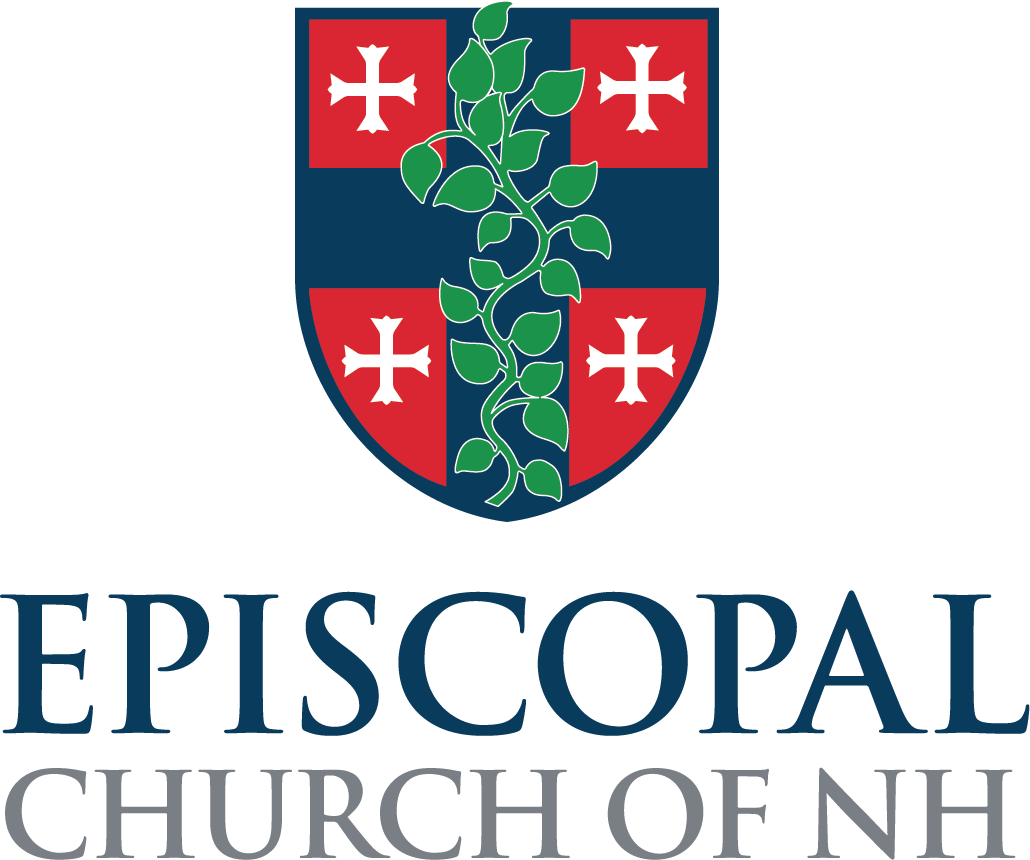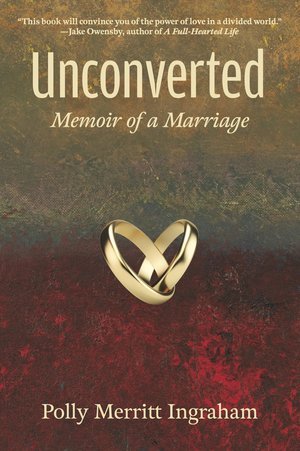By Susan Sherrill Axelrod
This week, Rootstock Publishing released Polly Merritt Ingraham’s first book, “Unconverted: Memoir of a Marriage” (Rootstock Publishing, June 17, 2025). More than a decade in the making, it’s a story of love, seeking, and commitment—to her husband, her children, her own profession in public education, as well as her quest to live out key beliefs and values. Ingraham, the School-to-Career counselor at Belmont High School, is married to Bishop Rob, and over their almost 35-year marriage she has sought to nurture and sustain their deep bond, while preserving her identity as unaffiliated with any one denomination. Instead of in a church sanctuary, she has found community and purpose on her children’s sports fields and in the various neighborhoods where the family has made their home while Rob was building his career. The book is elegantly constructed, smart, and occasionally quite funny; Ingraham poses thoughtful relatable questions without taking herself too seriously. It’s an eyes-wide-open look at how a loving relationship can survive, and in fact thrive, despite significant differences.
This interview has been edited for length and clarity.
Polly Ingraham: I started feeling inspired to write this back when we lived in Amherst before Rob was called to be bishop, and I was going regularly to church with our children sitting in the pew and essentially thinking, "How did I get here?"
Susan Axelrod: You weren't raised in the church?
PI: No, I was raised with almost no church, except for some experience going to Quaker Meeting with my grandmother. It was a very happy childhood. I had four older brothers, who had a big influence on me. It was a busy life, and we lacked for nothing. Occasionally it would cross my mind, "We don't go to church, but many of our friends do."
After Rob and I fell in love, got married and settled in, I thought, "This is probably a little unusual." Then that was confirmed because I began to glean that a lot of people assumed as soon as they met me, that I must be religious too. And I thought, "That's interesting. Why? They don't even know me."
I don’t need to tell you, I’m sure, there’s something that often feels old-fashioned about certain aspects of church life. Everybody is so nice. Still, for spouses anyway, there’s often this feeling that doesn’t really exist with other professions.
SA: …that you’re expected to be the help meet. I know because my father was a priest, and my mother felt that. Even though she is a pretty religious person, she rebelled a bit against the clergy wife thing because she always wanted to have a career, but she was still in the pew on Sunday mornings with the three of us.
PI: And so was I; I wouldn't do it any differently. It was one question that was important to Rob, “Will our children be raised in the church?” I totally understood, and they were. So, now I'm on the other side of it and I have had some time to muse about this. Rob has been very supportive about my drive to write the book.
I have some skill as a writer, I have some skill observing, I have some skill at trying to find things that are funny in life. And so, I've tried to tell my story of being married to a priest.
Whenever there have been clergy spouse gatherings, it struck me as very interesting that there’s a sense of “we're all in this together.” And besides being in a similar situation, we’re all likely Episcopalians. I mean, that's not even a question, even though wouldn't it be possible that some partners might be from a whole different tradition?
What I hope that I’ve portrayed in this story is that love works in mysterious ways, that you can love someone and still not quite become that person. In fact, a relationship can be enriched by the interplay that goes on when distinct differences are recognized and respected.
SA: To quote author Jay Owensby from the cover notes: “This book will convince you of the power of love in a divided world.” You and Rob are very different in personality type too, you're much more extroverted.
PI: He's more contemplative. But there are shared things that brought us together. We both read all the time. We both care a lot about physical workouts. We both care a lot about being kind to people.
There's one part early in the book—our first date when we went to a restaurant, and I was asking him questions: “What do you believe? How do you believe it?” It’s essential to the rest of my story—Rob trying to answer my questions and trying to be patient with me not knowing.
It's important to me to emphasize that part of why I wanted to write this was to try to display that love is not about being the same as your spouse. It's this kind of cross-fertilization that happens. You are constantly learning from and with one another. When Rob comes back from all his events that he does and he's tired, I will always ask about them because this is how I was raised, and I’m also genuinely interested. And yet sometimes Rob will say, "Oh Polly, that's the last thing I want to talk about. Please just tell me about your day; I need time to process that meeting on my own.”
Being an extrovert, I've learned from him the importance of quiet and that it can be a good thing for me too. For instance, when he says at night, "I'm going upstairs to read," sometimes I'll still have stuff I want to tell him. But I realize that when he goes upstairs it means quiet time. And I say, "You know what? That's a good idea. It can wait."
One of my chapters is about the day of Rob’s consecration. My hope was that this description would speak to other spouses/partners, especially those with spouses/ partners in the public eye, because what it's like for all the people there to celebrate is different from what it's like for the spouse/ partner. Everybody was so happy that day, and I was thinking, "Wait a minute, what is this going to mean for us?"
SA: How did you find time to work on the book?
PI: I started drafting early chapters back when I had what I called my “clergy wife journal”—keeping a lot of impressions about our way of life without knowing what the structure of a full-length book could be. Then, after we’d been in New Hampshire for several years, I enrolled in the Memoir Incubator program at Grub Street, a non-profit creative writing center in Boston. The premise there is “You come to a weekly class here for a year, and you will leave with a first draft.” I finished that in 2018, and thought I’d be really done in another year after absorbing all the feedback I got from my classmates, but then the “querying” process (reaching out to agents and publishers) took several more years. Ridiculous, right?
Now, I'm running the gamut between being proud of the fact that I finished the book, pleased that I have a good publisher, and a little bit exhausted by the no-end-in-sight feeling that has been there for months. And then I combine that sometimes with, "Holy cow, what have I done?" and “What will people think?” But then I realize that I never set out to do anything but tell my own story truthfully and vividly; I hope that it will resonate with people who are both inside and outside the church world.
You can pick up a copy of “Unconverted” at Gibson’s Bookstore in Concord, which will host Ingraham and her friend and fellow author, Ian M. Rogers, for a book launch event on Wednesday, July 9, at 6:30 p.m. Also find the book on Amazon and IngramSpark. Learn more about “Unconverted” and author Polly Merritt Ingraham here.

